Debitum Review Summary
Debitum (previously Debitum Network) is a regulated Latvian platform that offers investments in small and medium-sized enterprises (SMEs). However, it has a controversial history. The company has been criticized for concealing information about its origins and defaulted loans from Ukraine.
Main takeaways from our Debitum review:
- Easy-to-use platform
- Not suitable for conservative investors
- Higher concentration risk
Read our Debitum review to learn more.
What is Debitum?
Debitum is a regulated Latvian platform offering asset-backed securities investments starting from just €10. Investors on Debitum can earn up to 15% annually.
Pros
- Intuitive investment platform
- Regulated in Latvia
Cons
- The community founded Debitum Network through a Token Generation Event (TGE), and the platform didn't honor its plans to develop usability for the DEB token
- No secondary market
- High concentration in the Latvian forestry industry
- Politically exposed personnel operate some of the lending companies
Disclaimer
We are not affiliated with Debitum or any of its previous legal entities. This overview highlights key aspects of the platform’s development over the years.
Investors are encouraged to verify the information presented, as we do not continuously monitor the platform. As a result, we have removed the rating.
Nothing on this page should be considered investment advice. For transparency, we have included additional feedback from the management, who dispute some of the information provided.
Our Opinion Of Debitum
Debitum isn't suitable for conservative investors. Based on the available data in 2026, Debitum primarily finances a Valmiera-centric forestry, land, and construction ecosystem, with capital distributed across multiple issuers that are operationally and structurally connected.
While this model has enabled rapid AUM growth, it also introduces concentration and correlation risks that investors should factor into their risk assessment, especially when comparing Debitum to more diversified P2P marketplaces.
As always, investors should evaluate whether the platform’s risk profile aligns with their own diversification goals, sector exposure preferences, and tolerance for interconnected credit structures.
Origins
On March 13, 2018, the company—then operating under the brand name Debitum Network, managed by Prosperitu SIA—raised $17.2 million from backers. However, the company failed to deliver on the original promises outlined in the Debitum Network whitepaper.
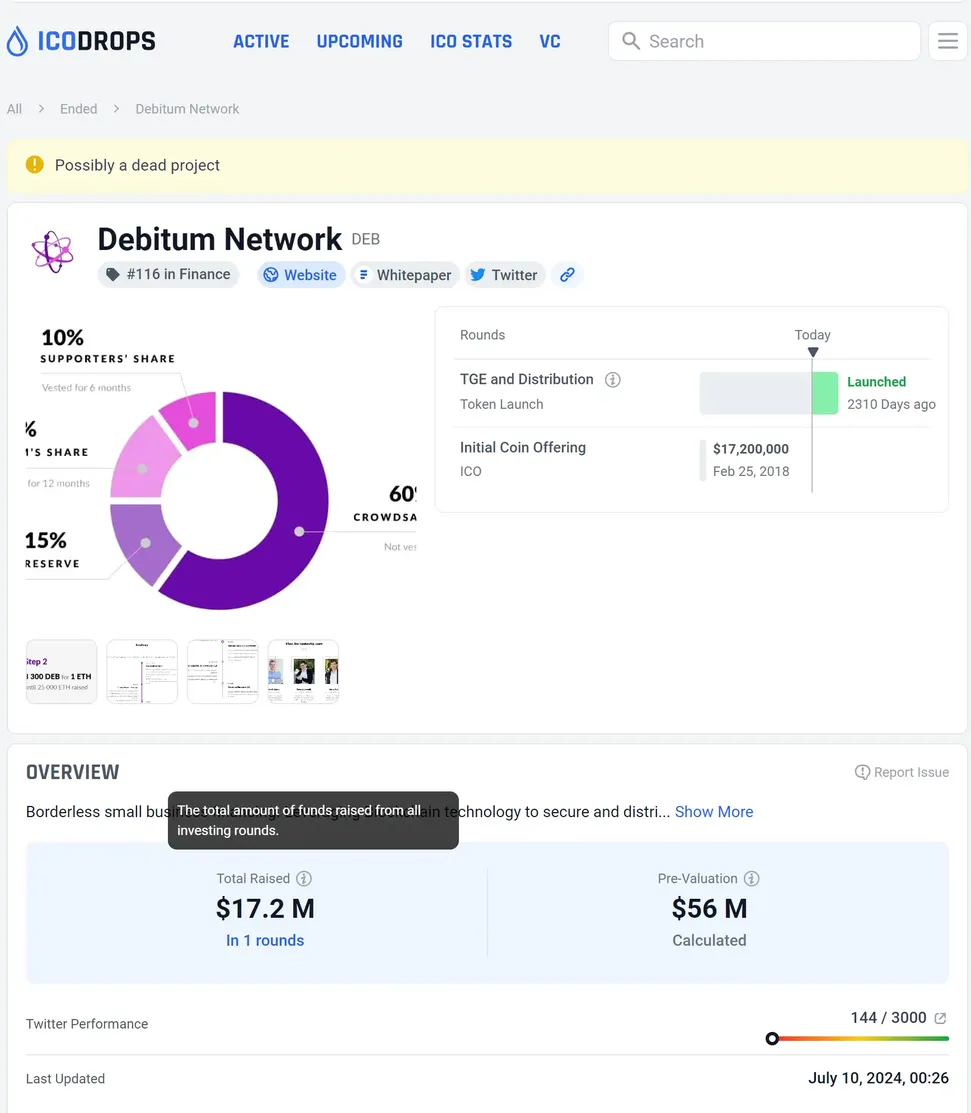
Unfulfilled Promises
Debitum Network is committed to creating utility for the DEB token, providing holders with additional value. While the platform initially offered a few minor services where users could use the tokens, these offerings were limited in scope and impact.
Despite raising over $17 million—sufficient funds to launch in over ten countries—the company failed to expand as promised. This raises a critical question: where did the money go?
Management Changes and Lack of Transparency
Over time, Debitum Network removed information about the DEB token from its website. The company rebranded from Debitum Network to simply Debitum, and in 2019, the platform operator was changed to a newly established entity, "SIA DN Operator," which had no connection to the external financing secured in 2018.
In July 2023, the former owner, Martins Liberts, sold the company "DN Operator SIA" to new owners: Henris Jansons, Ingus Samins, and Eriks Rengitis. During the transition, the new management explicitly stated that they were not liable for the DEB token asset. This action was approved by the Latvian regulator, raising concerns about potential regulatory cover-up.
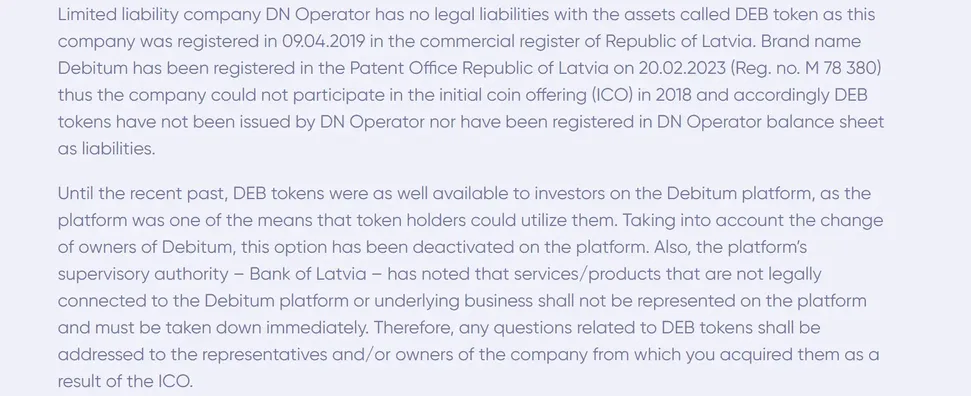
Debitum's new management conducted an independent review of "SIA DN Operator," the current operator of the platform, which found no evidence of external financing. However, the review did not extend to other legal entities involved in the platform's development. You can view the new management's statement in this interview.
Feedback from the New Management
The legal entity behind the platform, Debitum Investments (DN Operator LLC), has no connection to the 2017 ICO or the DEB Token. This has been confirmed by our regulator, the Bank of Latvia, as part of the licensing process. The auditor Grand Thornton verified that Debitum Investments never used any funds related to the ICO and holds no liabilities associated with it.
Investor Concerns
We surveyed our community of investors regarding Debitum's business practices, and 86% of respondents believe that Debitum is a scam.
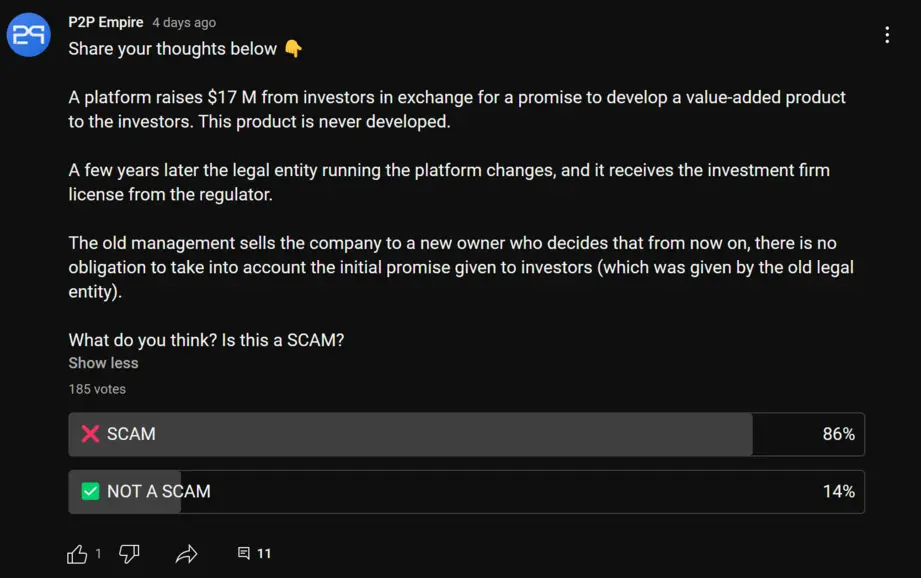
As of February 2026, while Debitum has fulfilled its contractual obligations to P2P investors, it has neither returned the funds nor developed any value-added features for the original backers who funded the Debitum Network's development.
To our knowledge, €1.75 million of investors' funds remain trapped in Ukraine, despite Debitum's claim that all funds have been repaid. This is inaccurate.
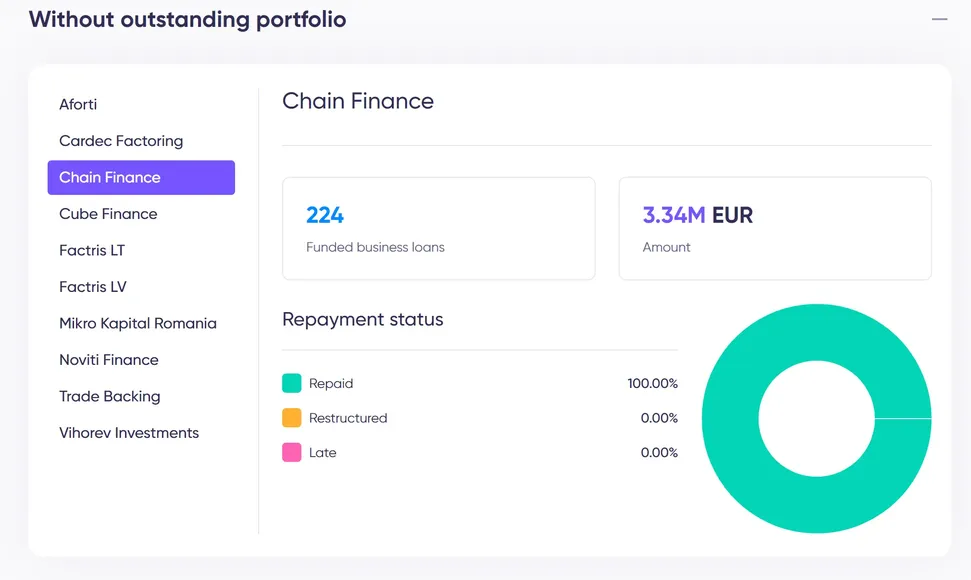
In March 2025, Debitum added a disclaimer to the information about Chain Finance and its restructuring process.
Feedback from the New Management
Fact: War-affected Ukrainian loans are neither in default nor overdue. These loans have been legally restructured, with a legal opinion confirming our right to implement this process on behalf of investors.
Recent Developments
In July 2023, Debitum announced a restructuring of the debt in Ukraine via a three-party agreement through SIA DN Funding Alpha (owned by Debitum). The platform introduced a wishful repayment plan that would pay out the outstanding principal within six years after the war in Ukraine was over.
In a June 2024 interview, the new CEO mentioned that an external investor is interested in purchasing claim rights in Ukraine from affected investors at a 40% discount.
In February 2024, Debitum rebranded again to "Debitum Investments" and moved to a new domain, seemingly to distance itself from the negative reputation of Debitum Network.
Is Debitum Safe?
You should do your due diligence when choosing a new P2P lending platform.
Why?
We dug deeper than most financial bloggers, who are happy to praise Debitum for short-term commissions. Here is the result of our due diligence on Debitum.
Origins of Debitum Network
Debitum Network was founded by three Co-Founders Martins Libert, Donatas Juodelis and Justas Šaltinis.
All of them are connected to the Latvian factoring company Factris, which acquired another invoicing company Debifo back at the beginning of 2019.
According to the LinkedIn profiles of the co-founders Donatas Juodelis and Justas Saltinis, they are no longer active in developing the Debitum Network.
The three co-founders raised USD 17.2M worth of Ethereum via a token generation event by issuing the so-called DEB token, which was intended to provide users with potential returns.
Shortly after the issuance, the co-founders converted the raised crypto into fiat and funded the platform's development. None of the backers have ever seen a refund or benefited from the DEB token, which essentially funded the platform.
The original management has not disclosed how the funds have been used. Based on our knowledge, a platform like Debitum Network didn't cost millions to develop.
Debitum's ICO and the DEB Token
Experienced investors may recall that Debitum Network participated in a Token Generation Event (TGE), where the platform sold DEB Tokens, a type of utility token, to contributors. The funds raised from this event were intended to build the platform and expand the business.
According to Debitum’s whitepaper, the platform was designed to address the credit gap for small and medium-sized enterprises (SMEs). The founder has confirmed that this goal remains a priority for the platform.
For more details about the Initial Coin Offering (ICO) and the intended utility of the DEB token, we recommend watching our full P2P talk. At the 13:45 mark, the former CEO stated that the platform raised nearly $18 million to develop it. At mark 15:48 the founder explained that the raised funds were used to build the platform, cover marketing and business development expenses.
The CEO also committed to further enhancing the utility of the DEB token—a promise that was ultimately not fulfilled.
Current Leadership
In 2023, the company was sold from the previous management to Mr. Rengitis. During the transaction, the management ensured that any trace of the DEB token would be erased to cover the ICO pursued by the initial founders.
As of 2026, Ingus Salmiņš is the owner and CEO of the Debitum platform.
Debitum 2.0 - What You Need To Know
Debitum 2.0 follows a different concept from its previous version. The new management grew assets under management to €50M, which is very impressive, given that other market players struggled to increase their AUM in recent years due to a lack of high-quality loan books. On the surface, Debitum is thriving while offering investors returns of up to 15% per year.
As of January 2026 Debitum has the following portfolio allocation (Source: the platform's Statistics):
- Evergreen Capital (€0.6M) - external lender
- Triple Dragon (€6.38M) - external lender
- Sandbox Funding (€10.32M)
- DN Funding Alpha - Ukraine defaulted loans (based on Debitum's statistics €0.2M - based on our information: €1.75M)
- Foresto (€25K)
- Juno Finance (€365K)
- Latvian Forest Development Fund (€33.65M)
- Baltic Terra (no statistical updates)
Based on this data, approximately 14% of the portfolio is allocated to external lenders, while around 86% is concentrated in a group of internally connected companies, primarily operating in the Latvian forestry, land, and construction sectors.
Internal Lenders
While Debitum is commonly perceived as a P2P marketplace with multiple independent originators, the majority of outstanding loans are linked to companies operating within the same geographic region and industry cluster.
Several of these entities also show overlapping ownership, management, or operational relationships.
The following overview summarizes publicly available information about selected internal lenders funded via Debitum:
Sandbox Funding
- Owned by ZIdea (Ingus Salmiņš) + Amplo (Eriks Rengitis)
- Previously owned by WIN WIN INVESTMENTS (Henrijs Jansons)
- Largest creditor of Juno Finance
- Entry-level originator heavily promoted on Debitum
Baltic Terra
- Owned by Jānis Lezdiņš
- Agricultural land strategy
- Personnel overlap with Dižozols ecosystem
BONO House
- Owned by SIA BONO (spouse of Galvanovskis + Juris Andžejevskis)
- CLT / eco-housing projects
- Valmiera-centric
Foresto
- Owned by Juris Andžejevskis
- Forestry aggregation fund concept
- Same regional / people cluster
Juno Finance
- 100% owned by Guntars Galvanovskis (ex-politically exposed)
- Largest creditor: Sandbox Funding
- Sales run by Jānis Lezdiņš
LFDF (Latvian Forest Development Fund)
- Owned by Intelligent Innovations → Jānis Upenieks - Parliamentary Secretary @ Ministry of Finance in Latvia (politically exposed)
- Forestry assets
- Historical BONO board overlap
Here is a visualization of the management overlap between the mentioned companies.
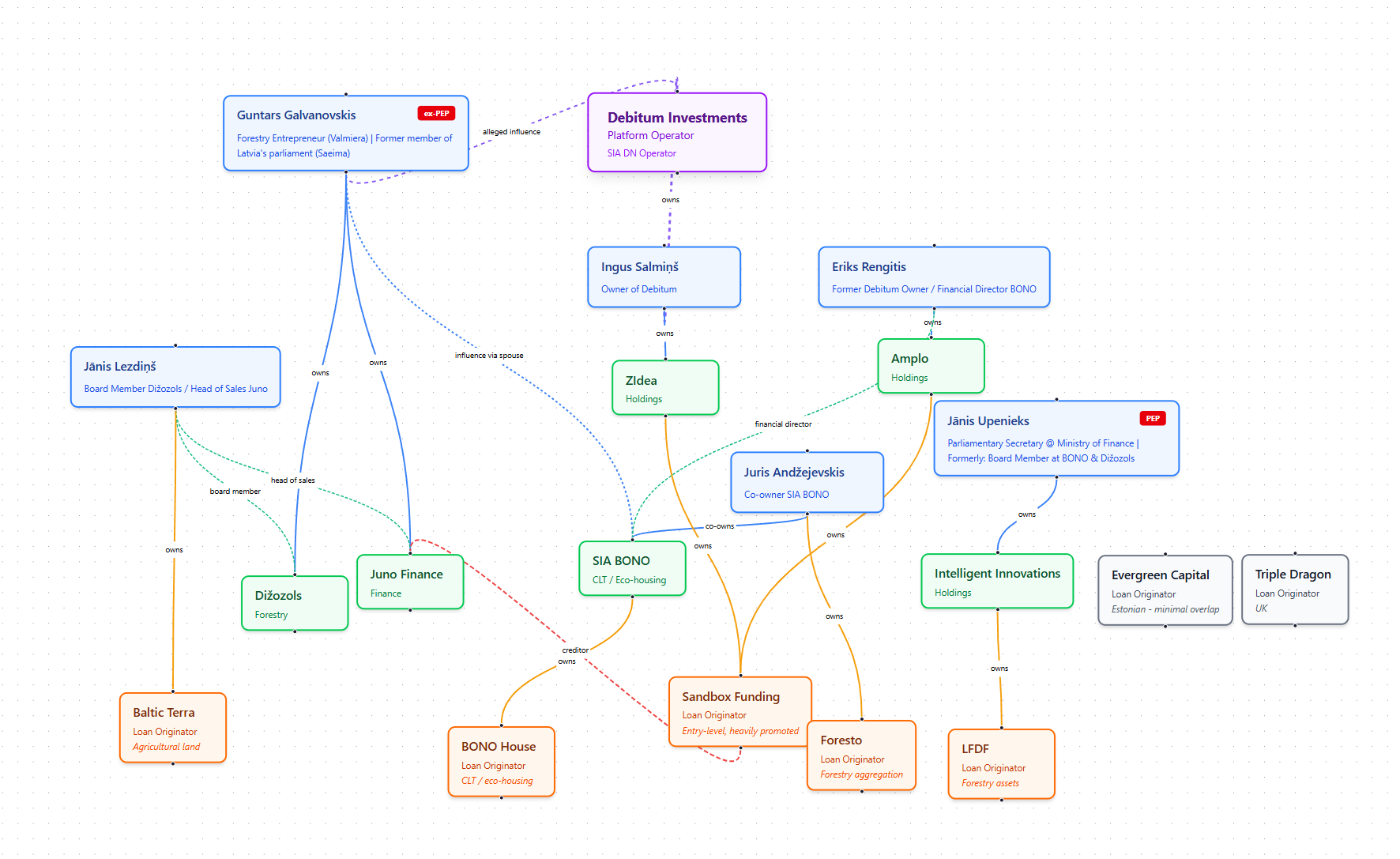
When evaluating the investment structures, it is apparent that Debitum primarily funds Valmiera-centric forestry/land and construction ecosystems, recycled across multiple issuers and funding vehicles.
Key Risk Considerations
When evaluating Debitum’s current structure, investors should be aware of several structural and concentration-related risks, independent of platform performance or intent:
High sector concentration risk
A large share of investor capital is exposed to a single industry (forestry, land, and construction), increasing sensitivity to sector-specific downturns.
Geographic concentration
Many internal lenders operate in the same region, which may amplify regional economic, regulatory, or liquidity shocks.
Interconnected counterparties
Overlapping ownership, management, and creditor relationships can increase correlation risk, where stress in one entity may impact several others simultaneously.
Limited diversification despite multiple issuers
Although loans are spread across several issuers, the underlying economic exposure may be less diversified than it appears at first glance.
Refinancing and capital recycling dependency
In ecosystems with closely linked issuers, refinancing activity may play a larger role in sustaining loan flows, which can affect liquidity during periods of market stress.
Based on the findings from our research, we reached out directly to Debitum. The platform's responses were coherent, detailed, and consistent with our findings. We have found no evidence of undisclosed ownership or regulatory evasion.
These risks are largely disclosed, but require investors to actively interpret prospectuses rather than relying on surface-level diversification signals.
Debitum Alternatives
Debitum is undoubtedly not the best platform for risk-cautious investors in the industry. The company's troubled history does not sit well with many market participants.
While the loan availability on the best P2P platforms is limited, the risk of losing your hard-earned money is much lower.
Here are a few suitable Debitum alternatives.
Fintown
Fintown is a Czech-based crowdfunding platform raising funds to refinance the equity of the Vihorev Group, which is developing rental properties in Prague. If you invest in operational rental properties, you can expect monthly rental income, increasing your cash flow from P2P loans.
The company backing Fintown has a good track record and excellent payment morale. Learn more about the platform in our Fintown review.
Nectaro
Nectaro is a regulated P2P lending platform based in Latvia, offering investment opportunities in loans from Moldova and Romania. With loan terms ranging from 2 to 5 years, Nectaro offers greater loan availability than some other platforms. All loans are backed by a buyback obligation, offering an added layer of security for investors.
Learn more about Nectaro in our Nectaro review.
Indemo
Indemo is a regulated Latvian crowdlending platform offering investments in discounted Spanish debt with a minimum expected return of 15% and a lock-up period of at least 2 years. The platform provides a unique concept in the industry, while so far, delivering above-average returns for the community.
Their business model is straightforward, and based on the key information sheet, the risk profile is lower compared to the investments on Debitum.
Read our Indemo review to learn more about the platform.



























